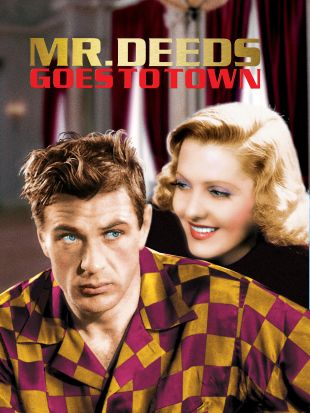
Frank Capra built his career around the themes that he explores in Mr. Deeds Goes to Town. For the populist Capra, the battle lines are clearly drawn; he makes his points (sometimes heavy-handedly) by pitting small-town simplicity, selflessness, and idealism against big-city sophistication, greed, and cynicism. Capra raised the "little guy" to iconic status, stereotyping him as effortlessly as he stigmatized the corrupt city slicker. Gary Cooper's Longfellow Deeds often looks as if he is visiting from a different era, an errant knight guided by an anachronistic code of chivalry. He is not afraid to resort to violence if words don't get the job done, although his impassioned speeches tend to get him in more trouble than they get him out of. He is looking for a "damsel in distress," and he is guided by an archaic and romantic notion of "noblesse oblige." Jean Arthur makes her first of three Capra appearances as this damsel, the hard-nosed reporter who exposes Mr. Deeds to ridicule. Her nasally, pointed line delivery is sharp and precise, and Cooper's trademark laconic delivery is also perfect for the role. Playing the part as if born to it, Cooper is at the top of his game, imbuing Deeds with just the right blend of empathy and intelligence. Nominated for five Academy Awards, including Best Picture and Best Actor, Mr. Deeds Goes to Town won Capra his second of three Best Director trophies.
